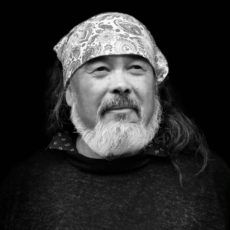 Dune Lankard is a Native Eyak of the Eagle Clan from Cordova, Alaska, who has committed his life to protecting Eyak culture, his ancestral lands and “a wild salmon way of life”. Dune started his talk with the class with a brief review of the more recent history of the Eyak people, a story that includes earthquakes, the Valdez oil spill and climate change resulting in measurable increases in the ocean’s temperature and acidification. Dune shared beautiful pictures of the land and water where he grew up, along with images of the visibly melting glaciers and the devastated coastline and impacted wildlife left behind by the Valdez spill. The heart of Dune's talk, though, was about how he and his organization have worked together to save the land so that, as he put it, “there would be something to fight about later.” In describing this part of the journey, Dune exemplified the aspect of the social entrepreneur as someone who sees a problem, becomes obsessed, and then leverages whatever resources they have access to in an effort to realize the change they can see in their heads as though it has already come to pass. Along these lines, Dune’s efforts through the Native Conservancy have included writing federal policy, kelp farming, experimenting with innovative freezing processes to achieve food sovereignty for the elders in his community, hosting famous musicians on rafting trips down the Copper River, and building better fishing boats out of hemp resin using 3D printers (to name just a few). In describing these projects, Dune also referenced the many ways in which a corporate structure - in direct contrast to traditional indigenous practices - contributes directly to an extractive relationship with the world around us. He referenced the ways that Alaska had created a corporate strategy for the individual ownership of oil rights and fishing rights that had led to Native people unwittingly forfeiting control (and by extension losing access to their role as stewards of our lands and waterways), and warned against the dangers of allowing a similar approach to the further annexation of our oceans. It made me think about the conversation we had had as a class the week before on Patagonia’s journey, and wonder about how we might more deeply explore the implications of this concept, especially as we exist in the context of the business school. While Dune talked about the importance of his mother as an inspiration, and about the importance to him of honoring and caring for the elders in his community, I also appreciated that he mentioned the importance of leadership of the next generation. He talked specifically about Nick Tilsen and the NDN Collective, and he apologized to my students on behalf of our generation for not leaving them a world in better condition. I was particularly moved by his ask of the students that as they consider their respective paths, that they incorporate the role of guardian into their lives. It is worth noting that Dune did all of this while we were experiencing mild Zoom hell. The screen reportedly turned off while Dune was speaking, though his vivid storytelling overpowered the technical interruptions. I mention it only because it is easy in discussing these classes to share the high level concepts, while the experience of teaching - and I imagine, learning - is also shaped by these more mundane details. One nice post-script to the class, I have already received an email from a student asking if I thought Dune and his organization might be willing to consider her for an internship. The second half of class was focused on the students’ team presentations on social entrepreneurs, and we were only able to get through three because of the technical SNAFUs. I’m always interested to see which leaders the teams select - so far they’ve done Warby Parker, and two social entrepreneurs I hadn’t heard of previously, Jessica Schreiber, founder of FABSCRAP, and Hla Hla Win, founder of 360ed. We’ll have the final two presentations this coming week. One thing to note here is that Melissa and I are experimenting with having the students contribute to the grading of their peers’ presentations, working from a presentation evaluation rubric. I have not taken a look at those yet - I wanted to wait until all the presentations were done - but I will be interested to see how their assessments compare to my own. We will be joined by Willy Foote from Root Capital this week and the readings include one from Willy himself: “To Invest in the Future of Coffee, Starbucks Turns to the Capital Markets,” Willy Foote, Forbes https://www.forbes.com/sites/willyfoote/2016/05/23/to-invest-in-the-future-of-coffee-starbucks-turns-to-the-capital-markets/?sh=51e123341174 along with finishing up Krakauer’s Three Cups of Deceit
2 Comments
2/4/2023 05:57:44 am
Excellent article! Thank you for your excellent post, and I look forward to the next one. If you're seeking for discount codes and offers, go to couponplusdeals.com.
Reply
Leave a Reply. |
Jill's BlogPeople need meaning, the opportunity for mastery, and community to thrive. Creating opportunities for people to contribute, and to find their best selves is some of the most important work we can do. |